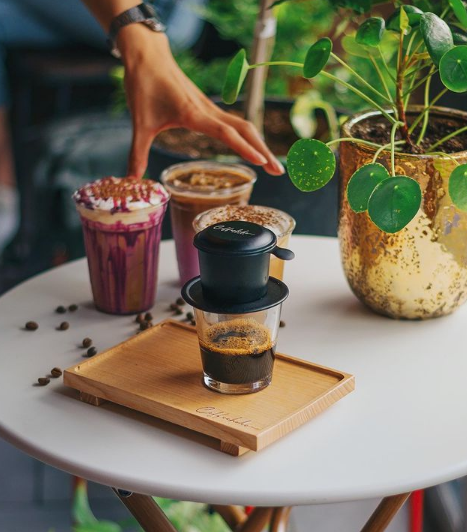 |
| Vietnamese traditional phin filtered coffee-making method. Source: Coffeeholic House |
Starting last year, more and more Vietnamese coffee shops opened in Seattle, Washington (US), aiming to share the Vietnamese coffee culture with a broader audience while combining it with that of the Pacific Northwest, according to the Seattle P-I.
“There’s a fully caffeinated Vietnamese coffee movement sweeping America,” Dan Q. Dao wrote recently in a feature in Imbibe Magazine that spotlighted shops around the US, including Phin and Hello Em, both in Seattle’s Chinatown-International District.
Most Vietnamese coffee drinks revolve around the slow-dripping filter that sits atop a single glass, called a phin (and from which that shop takes its name). But, “There’s more to Vietnamese coffee culture than just the way it’s made — it’s how it’s enjoyed,” Dao explains, demonstrating why the shops fill more of a need than just grabbing a cà phê sữa đá at a bánh mì shop.
“In Vietnam, coffee can be fast, but it tends to be a more leisurely affair.”
Each of the new coffee shops finds its own priorities in how it preserves tradition – through its sourcing of beans, roasting style, drink options, and ambience – and how it innovates or evolves to make the shop fit in today’s Seattle.
Coffeeholic House
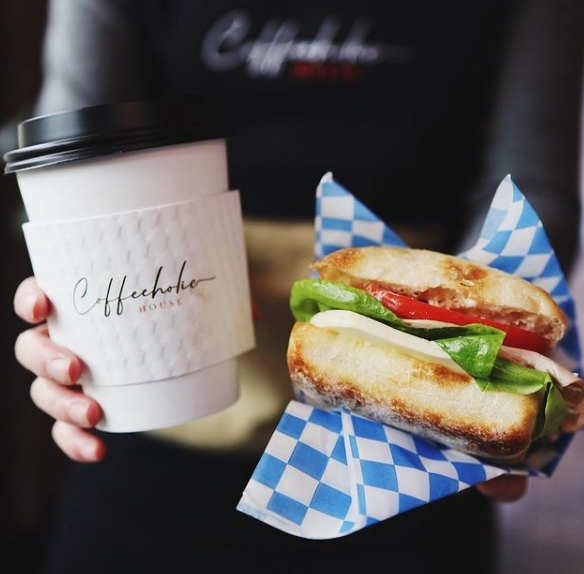 |
| Toasty turkey sandwich pairs with a hot Vietnamese Latte. Source: Coffeeholic House |
Coffeeholic’s Columbia City opening in March of 2020 came just as the pandemic began, but the shutdowns and safety precautions hardly slowed the flow of crowds searching for the Coffeeholic dream – their signature coffee prepared using the traditional phin, topped with cheese foam – and the Instagram darling ube latte.
Its owner Chen Dien, who is from Ho Chi Minh City, created the shop with his wife Trang Cao. They bring together both their many years in the coffee industry with their desire to showcase a modern take on traditional Vietnamese coffee culture.
The drinks incorporate a variety of coffee traditions, including taking cues from boba trends and tea shops around the Asian world – like the cheese foam, colorful squirts of ube syrup, and matcha options. But the beans come sourced from Da Lat city of the Central Highlands province of Lam Dong, before getting roasted right here in Seattle, a demonstration of the shop’s interwoven geographies.
In the coming months, Coffeeholic House plans to open a second location in Greenwood, this one twice the size, which means the potential for an expanded food menu, outdoor seating, and later hours.
Sip House Seattle
Just a few months after Coffeeholic’s opening last spring, Sip House quietly opened in the University District, serving a similar selection of phin-based traditional Vietnamese coffee drinks and a broad selection of more creative hot and iced drinks – like the popular mint mojito iced coffee.
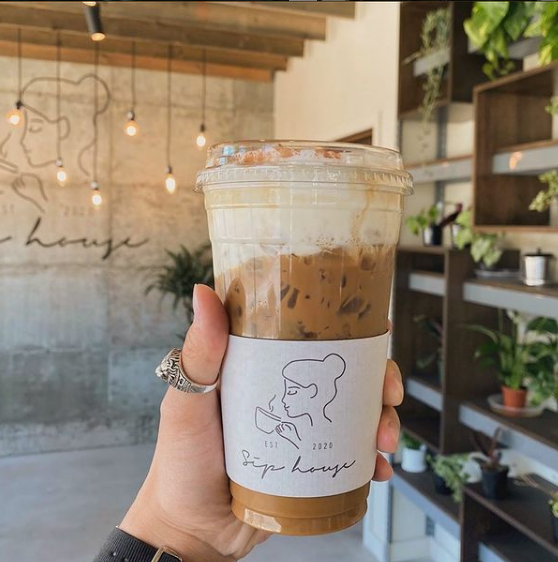 |
| Ca Phe Sua Da with Crema and our Coffee Crema. Source: Sip House |
Their beans — a mix of the Arabica most Seattleites are accustomed to — and the typical Vietnamese Robusta beans, which comes from a family farm in Vietnam. The array of brew options at Sip House makes good use of the extra strength of Robusta beans, which have twice the caffeine, by allowing a slightly lighter drink without forgoing any of the energy. The cold brew crema, a favorite, comes sweetened with cane sugar and topped with a cheese-flavored cream.
But, like Coffeeholic, the pandemic tampered one of the best parts of Sip House: the aesthetics. The stylish spot boasts minimalist design, like the simple black line-drawn logo on the bare cement wall, that allow the colors of the drinks to pop. The warmth of plants balances it out, including a wall of live greenery and a painted mural of a flower bouquet just pale enough pink to stand out without overwhelming. And, while the drinks are the main focus here, they also offer a small food menu, including mini-loaves of the social media sensation garlic cheese bread.
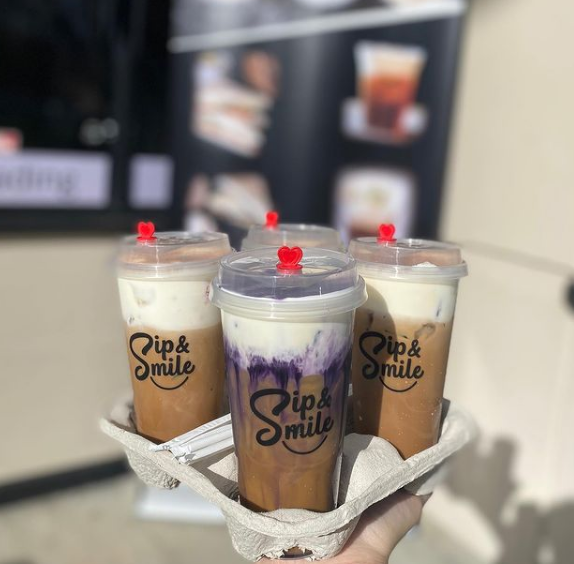 |
| Ube sip coffee. Source: Sip and Smile |
Sip and Smile
“Auntie Mai,” earned a reputation for making great coffee as a barista in HCM City. Decades later and a continent away, her skills found a new home inside her daughter’s Renton beauty shop after her son-in-law had to close his construction business – and instead turned his focus to selling coffee.
Though the menu is much smaller than at some shops, it has traditional phin coffee as well as an ube version and their “Bamdan” coffee with pandan, oat milk, and sea salt foam. There’s also a small selection of teas and a quartet of sandwiches on shokupan, including a Japanese-style egg salad, smoked salmon with cucumber and chives, a pork smash with dried shredded pork and cream cheese, and the “pearadise” with pears and Lao sausage. And latter they added a swoon-worthy dessert option: La Dulce’s Basque burnt cheesecake.
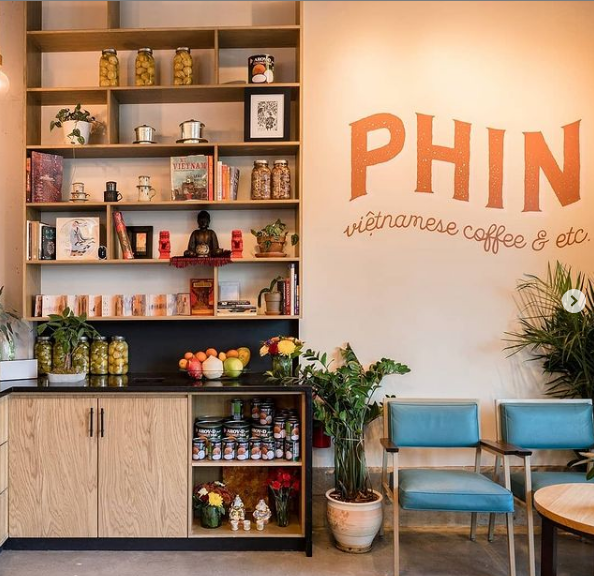 |
| Making coffee using phin filter is a brewing method is part of Vietnamese coffee culture. Source: @phin.seattle |
Phin
Unlike many of the shops that opened before it, Phin stays focused on traditional Vietnamese drinks, drawing inspiration from (and brewing with) the influx of quality coffee beans coming from Vietnam. Though it plays around within the genre, all the coffee drinks use the classic brewing utensil the shop is named after, and there is no matcha, ube, or cheese foam. But there is still creativity from HCM City-born owner Bao Nguyen.
He says his shop is deeply inspired by the old school coffee shops of his dad’s generation, but also entirely their own. “In my eyes, traditions are guides, not anchors,” Bao wrote in Eater. He didn’t invent the yogurt coffee, but he brought it to Seattle and figured out how to make it work with his own yogurt. The pandan waffle was inspired by a treat he remembered from childhood festivals but remade as Phin’s own signature snack.
The stylish inside manages to evoke both Vietnam and another era through muted colors on the wall, painted red details, and a decorative balcony, but also through design. By brewing everything using a phin, drinks come out slowly here. This is a good thing, Phin explained in a recent Instagram post describing the Vietnamese entities that inspired the shop: “slow-paced sidewalk cafes where people meet and linger, sipping on coffee and tea as they watch the world go by.”
Hello Em
Yenvy Pham was new to coffee but old-hand at finding fun ways to serve the food and drink of her Vietnamese heritage. Her parents opened Pho Bac, one of the city’s first pho shops, in the early 1980s. She and her siblings built on the original shop with the more modern Pho Bac Sup Shop next door. But her partner at Hello Em, Nghia Bui, comes from a family still in the coffee business in Vietnam. The duo visited coffee farms in Buon Ma Thuot in the Central Highlands province of Dak Lak, before opening and his relatives there are the source of the Robusta beans they roast in-house.
 |
| Coconut cream with Milo egg cloud. Source: Hello Em |
Whirring like a carnival popcorn machine, the roaster sits just inside the entrance of Hello Em, so customers can watch the beans go from pale green to shimmering brown as they wait for their drinks. They can also read the history of Little Saigon on the wall, or study the map of Vietnam and its coffee next to it – all part of how Hello Em works toward a mission to highlight its communities, both geographic and cultural. It helps that it shares the space with the local organization Friends of Little Saigon.
But the real key to winning people over to Vietnamese coffee comes in the drinks, like the sweet, rich, slightly savory cà phê trứng – coffee topped with a condensed milk and egg yolk custard. While Hello Em uses an espresso machine rather than a phin for most of their drinks, that’s hardly the only place they deviate from tradition.
They also make a lighter “egg cloud” version of the cà phê trứng using the leftover egg whites, and the food menu includes bánh mì-nis – a cross between a panini and a classic Vietnamese sandwich – with variations including hot dogs and croissants.
|
Last year, Vietnam gained 2.66 billion USD from shipping 1.51 million tonnes of coffee abroad, falling 7.2% in value and 8.8 percent in volume year-on-year. Vietnamese coffee products have been present in more than 80 countries and territories worldwide, and accounted for 14.2% of the global coffee bean market share. In 2020, German, the US and Italy continued to be the largest coffee importers of Vietnam. |



